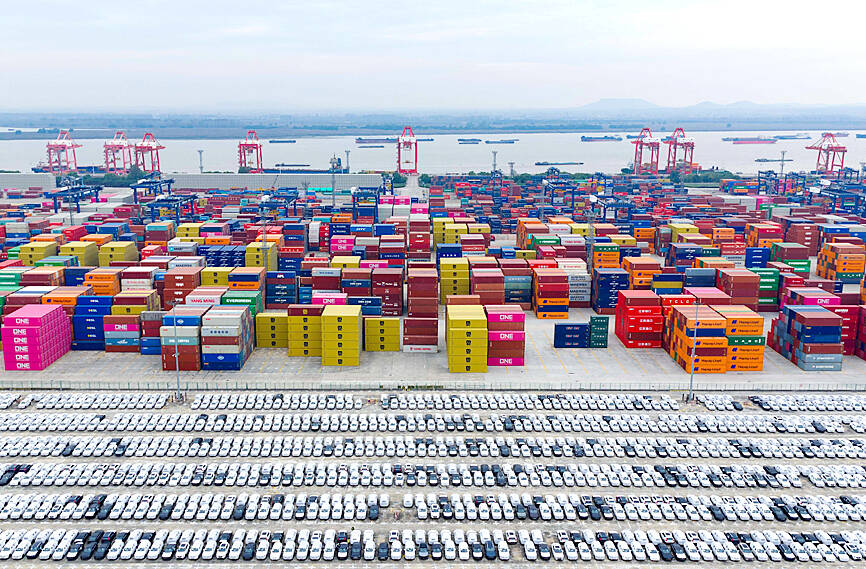China’s exports unexpectedly contracted last month as weakening global demand failed to offset the slump in shipments to the US, dealing a blow to an economy already slowing amid sluggish consumer spending and investment at home.
Exports fell for the first time in eight months, dropping 1.1 percent from a year earlier, according to official data released yesterday. Shipments to all nations except the US rose 3.1 percent, not enough to compensate for the more than 25 percent decline to the US.
“The exporters in China have been frontloading their trade in order to avoid high tariffs in the US — it seems the frontloading finally faded in October,” said Zhang Zhiwei (張智威), chief economist at Pinpoint Asset Management, a Chinese hedge fund management firm. “Exports have been a key pillar for growth in China due to the weak domestic demand. Now that export momentum weakens, China needs to rely more on domestic demand.”

Photo: AFP
Chinese exports have been resilient, as other destinations made up for drops in shipments across the Pacific Ocean. Sales abroad had grown every month since February, when activity slowed because of the Lunar New Year holiday.
October marked a break in the trend of growth driven by the pursuit of new markets among Chinese companies. A range of trade indicators started to cool off from the record numbers seen in earlier months, with the Port of Shanghai processing the fewest containers since April.
The decline in overall exports last month came as a surprise to almost all forecasters, with the median estimate of those polled by Bloomberg at 2.9 percent. Only a single analyst in the survey had predicted a decline.
With the US reducing tariffs on Chinese goods by 10 percent from Monday, it is possible trade between the world’s two largest economies could see a pickup through the year-end.
However, the effect might prove limited because duties on Chinese goods are still higher than those on products from countries such as Vietnam.
And if the slowdown in demand from the rest of the globe continues, that could pull down shipments and the broader economy in the final two months of the year. Last quarter, China’s economic growth decelerated to the weakest pace in a year even as exports boomed.
It risks an even steeper slowdown in the months ahead. Analysts forecast the weakest growth this quarter since the final three months of 2022, when the nation was nearing the end of debilitating COVID-19 lockdowns.
The weakness looked to be broad last month, when shipments to the EU climbed 1 percent, the slowest growth since February.
Even so, Chinese export prices have fallen every month but one since mid-2023 due to domestic deflation, compensating for the stronger currency and making shipments cheaper.
As a result, Chinese companies could continue to make inroads abroad during the trade war with the US.

TEMPORARY TRUCE: China has made concessions to ease rare earth trade controls, among others, while Washington holds fire on a 100% tariff on all Chinese goods China is effectively suspending implementation of additional export controls on rare earth metals and terminating investigations targeting US companies in the semiconductor supply chain, the White House announced. The White House on Saturday issued a fact sheet outlining some details of the trade pact agreed to earlier in the week by US President Donald Trump and Chinese President Xi Jinping (習近平) that aimed to ease tensions between the world’s two largest economies. Under the deal, China is to issue general licenses valid for exports of rare earths, gallium, germanium, antimony and graphite “for the benefit of US end users and their suppliers

Dutch chipmaker Nexperia BV’s China unit yesterday said that it had established sufficient inventories of finished goods and works-in-progress, and that its supply chain remained secure and stable after its parent halted wafer supplies. The Dutch company suspended supplies of wafers to its Chinese assembly plant a week ago, calling it “a direct consequence of the local management’s recent failure to comply with the agreed contractual payment terms,” Reuters reported on Friday last week. Its China unit called Nexperia’s suspension “unilateral” and “extremely irresponsible,” adding that the Dutch parent’s claim about contractual payment was “misleading and highly deceptive,” according to a statement

The Chinese government has issued guidance requiring new data center projects that have received any state funds to only use domestically made artificial intelligence (AI) chips, two sources familiar with the matter told Reuters. In recent weeks, Chinese regulatory authorities have ordered such data centers that are less than 30 percent complete to remove all installed foreign chips, or cancel plans to purchase them, while projects in a more advanced stage would be decided on a case-by-case basis, the sources said. The move could represent one of China’s most aggressive steps yet to eliminate foreign technology from its critical infrastructure amid a

Nissan Motor Co has agreed to sell its global headquarters in Yokohama for ¥97 billion (US$630 million) to a group sponsored by Taiwanese autoparts maker Minth Group (敏實集團), as the struggling automaker seeks to shore up its financial position. The acquisition is led by a special purchase company managed by KJR Management Ltd, a Japanese real-estate unit of private equity giant KKR & Co, people familiar with the matter said. KJR said it would act as asset manager together with Mizuho Real Estate Management Co. Nissan is undergoing a broad cost-cutting campaign by eliminating jobs and shuttering plants as it grapples